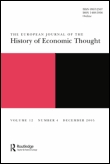
European Journal of the History of Economic Thought
Scope & Guideline
Cultivating Knowledge at the Crossroads of Economics and History
Introduction
Aims and Scopes
- Historical Analysis of Economic Thought:
The journal focuses on the historical development of economic ideas, tracing their evolution over time and examining the intellectual lineage of key thinkers. - Interdisciplinary Approaches:
It incorporates insights from various fields such as philosophy, sociology, and political science to enrich the understanding of economic theories and their implications. - Contextualization of Economic Theories:
The journal emphasizes the importance of historical, cultural, and social contexts in shaping economic thought, encouraging contributions that link theory with historical events. - Exploration of Underrepresented Voices:
It aims to uncover and highlight the contributions of lesser-known economists and perspectives, particularly those of women and marginalized groups in the history of economic thought. - Methodological Innovations:
The journal encourages discussions on methodologies used in the history of economic thought, examining how these methodologies influence the interpretation of economic ideas.
Trending and Emerging
- Ecological Economics:
There is a growing interest in the history and development of ecological economics, reflecting contemporary concerns about sustainability and environmental impact. - Interdisciplinary Dialogues:
An increasing number of papers are integrating perspectives from other disciplines, such as philosophy, sociology, and political science, to provide a more holistic understanding of economic thought. - Historical Perspectives on Modern Economic Issues:
Researchers are increasingly applying historical analysis to current economic issues, such as inequality, climate change, and financial crises, to derive lessons from past economic thought. - Reevaluation of Classical Thinkers:
There is a trend towards reinterpreting the works of classical economists like Adam Smith and John Stuart Mill in light of contemporary economic and social issues, particularly regarding their relevance to modern capitalism. - Focus on Gender and Economic Thought:
Emerging themes include a focus on the contributions and perspectives of women in economics, leading to a broader understanding of economic thought that includes previously marginalized voices.
Declining or Waning
- Classical Economic Theories:
There has been a noticeable decrease in papers focusing solely on classical economic theories, as contemporary discourse shifts towards more modern interpretations and critiques. - Traditional Economic Methodologies:
Research that strictly adheres to traditional economic methodologies is becoming less frequent, with a growing preference for innovative and interdisciplinary approaches. - Focus on Purely Theoretical Constructs:
The journal has seen a decline in articles that purely discuss theoretical constructs without empirical or historical context, as there is a stronger demand for research that connects theory with real-world applications. - Narrow National Perspectives:
Papers focusing exclusively on the national perspectives of economic thought are waning, as there is an increasing emphasis on global and comparative analyses. - Reduction of Biographical Studies:
While biographical studies of economists were once prevalent, there is a decline in interest in this area, with researchers preferring broader thematic explorations.
Similar Journals
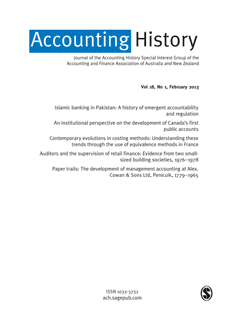
Accounting History
Exploring the Evolution of Accounting Through TimeAccounting History, published by SAGE Publications Ltd, is a distinguished journal that has been at the forefront of scholarly discourse since its inception in 1996. With its ISSN 1032-3732 and E-ISSN 1749-3374, it serves as a crucial platform for researchers and practitioners interested in the intersection of accounting practices and historical contexts. The journal holds impressive rankings, notably placing in the Q2 category in Accounting and Q1 in History as of 2023, underscoring its significance in both the fields of accounting and historical research. Its Scopus rankings further reinforce its impact within the academic community, achieving a remarkable 95th percentile in the History category and a respectable 37th percentile in Accounting. Despite not being an open-access journal, it provides invaluable insights through rigorous peer-reviewed articles that explore historical accounting practices and their implications for contemporary issues. With a commitment to fostering a deep understanding of the evolution of accounting, Accounting History continues to be an essential resource for scholars, professionals, and students alike, eager to explore the rich narrative of accounting's past and its relevance today.
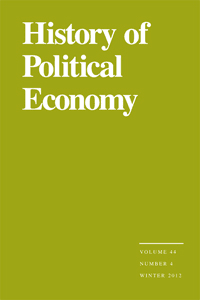
HISTORY OF POLITICAL ECONOMY
Decoding the Historical Narratives of Economic PoliciesHISTORY OF POLITICAL ECONOMY, published by DUKE UNIVERSITY PRESS, stands as a premier journal in the interdisciplinary fields of political economy and history. With an ISSN of 0018-2702 and an E-ISSN of 1527-1919, the journal provides a platform for rigorous scholarship that spans from its converged years beginning in 1986 to the present, aiming to elucidate the complex interplay between economic policies and historical contexts. It holds impressive rankings, peaking in the Q1 category for History and Q2 in Economics and Econometrics as of 2023, showcasing its impact and prestige in the scholarly community. Notably, it is ranked within the 88th percentile in Arts and Humanities History and maintains a significant presence in the 24th percentile for Economics and Econometrics. Although it does not currently offer open access, the journal remains committed to advancing knowledge and fostering thoughtful discourse among researchers, professionals, and students alike. Located in Durham, NC, the journal is dedicated to exploring the rich historical narratives that have shaped economic thought and policy, making it an essential read for those seeking to navigate the intricate landscape of political economy.
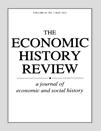
ECONOMIC HISTORY REVIEW
Exploring the Past, Shaping the Future of Economics.Economic History Review, published by Wiley, stands as a premier journal in the realms of Economics and Econometrics and History, established in 1927 and converging its reach through 2024. With an impressive impact factor reflected in its tier placements—Q1 in both Economics and History categories as of 2023—this journal provides critical insights and comprehensive analyses that advance understanding of economic historical developments. It is recognized in the Scopus Rankings with notable standings in the Arts and Humanities (Rank #25/1760) and Economics (Rank #259/716), placing it in the top percentiles in these fields. Although not an open access journal, it offers various subscription options, ensuring a broad dissemination of valuable research. The Economic History Review appeals to a diverse audience including researchers, professionals, and students eager to explore the intricate relationships between economic phenomena and historical contexts.
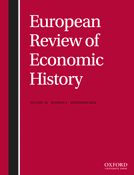
European Review of Economic History
Unveiling Insights into Economic Transformations in EuropeEuropean Review of Economic History is a premier academic journal published by Oxford University Press, dedicated to advancing the interdisciplinary understanding of economic history from a European perspective. With an impact factor that solidifies its standing in the realm of economics, the journal is distinguished by its Q1 category rankings in both Economics and History for 2023, placing it among the top-tier publications in its field. Established in 1999, it has consistently provided a platform for rigorous research, encompassing empirical studies, theoretical discussions, and insightful case analyses that illuminate the complex interplay between economics and historical development. While the journal operates under a traditional subscription model rather than an open-access framework, it remains integral for scholars and students seeking to deepen their knowledge of economic transitions and policy impacts throughout European history. With its strong reputation reflected in its Scopus rankings, European Review of Economic History plays a vital role in fostering academic discourse and advancing scholarship in this essential area of study.

History of Economic Thought and Policy
Charting the Historical Pathways of Economic PolicyHistory of Economic Thought and Policy is a vital journal published by FRANCO ANGELI, dedicated to exploring the intersections of economic theory, historical context, and public policy. With ISSN 2240-9971 and E-ISSN 2280-188X, this journal serves as an essential platform for scholars interested in the evolution of economic ideas and their implications for contemporary policy-making. Operating from Italy, it has established a comprehensive framework for interdisciplinary research in the fields of Economics and Econometrics, History, and Public Administration, although it currently holds a Q4 ranking in these categories according to 2023 metrics. The journal already encompasses multiple converging years from 2018 to 2024, underscoring its commitment to timely contributions to economic discourse. It aims to provide open access to its content, fostering a collaborative environment for researchers, professionals, and students keen on enhancing their understanding of economic thought throughout history. Despite its current challenges in Scopus rankings, with notable positions in arts, humanities, and social sciences, History of Economic Thought and Policy remains a promising outlet for significant and critical discussions surrounding the historical pathways that shape today’s economic policies.

BUSINESS HISTORY REVIEW
Advancing Knowledge Through the Lens of Business History.Business History Review is a prestigious academic journal published by Cambridge University Press that has been at the forefront of historical scholarship in business since its inception in 1926. With a strong emphasis on interdisciplinary research, it covers a wide range of topics within the field of business history, making it an essential resource for researchers, professionals, and students interested in understanding the historical contexts that shape contemporary business practices. The journal is recognized for its high scholarly impact, featuring a Q1 ranking in History and Q2 rankings in both Business and International Management and Business, Management and Accounting (miscellaneous) categories. Although not an open-access publication, it offers significant insights and groundbreaking research for its audience. With a commitment to promoting a deeper understanding of business's past, Business History Review remains a vital publication for those seeking to connect historical analysis with modern business challenges.

British Journal for the History of Mathematics
Bridging Past and Present in Mathematical DiscourseBritish Journal for the History of Mathematics, published by Taylor & Francis Ltd, serves as a vital platform for scholars engaged in the exploration of mathematical history and its impact on the evolution of education, philosophy, and science. With an ISSN of 2637-5451 and E-ISSN of 2637-5494, this journal showcases high-quality research articles that delve into the rich narratives behind mathematical concepts, theorists, and practices from ancient to modern times. Although currently categorized in the fourth quartile across key academic domains—including Education and the History and Philosophy of Science—its commitment to fostering scholarly discourse and providing accessible insights into the historical context of mathematics makes it an important resource for researchers, professionals, and students alike. While the journal may not currently offer open access, it aims to enhance visibility and dissemination of work from 2019 to 2024 and beyond, contributing to the understanding of mathematics not merely as a discipline but as a significant cultural artifact.

HISTORY OF EUROPEAN IDEAS
Exploring the Tapestry of European ThoughtHISTORY OF EUROPEAN IDEAS, published by Routledge Journals, Taylor & Francis Ltd, stands as a premier platform for the exploration and dissemination of scholarly research within the fields of history, philosophy, sociology, and political science. With an ISSN of 0191-6599 and E-ISSN of 1873-541X, the journal has established itself in the academic community as a Q1 journal in both History and Philosophy and Q2 in Sociology and Political Science as of 2023. Its rigorous publication standards contribute to its notable Scopus rankings, reinforcing its importance in the humanities and social sciences. Spanning from 1980 to 2024, the journal invites contributions that delve into the intricate interrelations of European ideas and their historical contexts, thus aiming to enrich academic discourse and advance knowledge in these disciplines. Although not available as Open Access, the journal’s curated content remains pivotal for researchers, professionals, and students seeking in-depth analyses and innovative perspectives on European thought.

CAMBRIDGE JOURNAL OF ECONOMICS
Exploring the Frontiers of Economic TheoryCambridge Journal of Economics, published by Oxford University Press, is a premier academic journal in the field of economic theory, policy, and applications, catering to researchers, professionals, and students alike. With a rich history dating back to 1977, this journal has established itself as a notable contributor to critical discourse in the arena of Economics and Econometrics. With an impressive Scopus ranking of #210 out of 716 in its category, placing it in the 70th percentile, the journal maintains a solid Q2 classification, reflecting its significant impact and contribution to the field. Although it operates on a subscription basis, the Cambridge Journal of Economics is accessible through a range of academic databases and libraries, ensuring that its high-quality research reaches a wide audience. The journal aims to advance the understanding and application of economic principles, making it an essential resource for anyone looking to deepen their knowledge or stay updated with the latest research trends in economics.
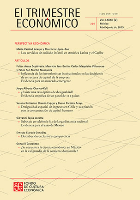
TRIMESTRE ECONOMICO
Empowering Insights in Economics and Econometrics.TRIMESTRE ECONOMICO, published by FONDO CULTURA ECONOMICA, is a prominent open access journal in the field of Economics and Econometrics based in Mexico. Since its inception in 1979, this journal has served as a critical platform for disseminating scholarly research and theoretical advancements within economic sciences, addressing both contemporary issues and historical perspectives. With an impact factor that ranks it within the Q3 category among 716 journals in its field, TRIMESTRE ECONOMICO continues to contribute significantly to the academic community, providing readers with insights into economic modeling, policy analysis, and empirical research. The journal has embraced open access since 2011, fostering a broad reach and encouraging innovation and collaboration among researchers, professionals, and students. It is essential reading for those seeking to deepen their understanding of economic trends and theories, making valuable contributions to both local and global discussions.